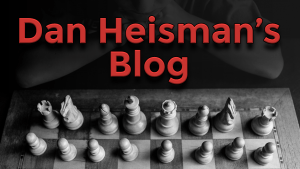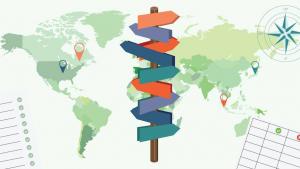Q&A with Coach Heisman June 21, 2013
Which modern super-GM would have the most interesting match vs Paul Morphy in his prime? Probably won't happen but, if it did, someone who would try to fight with the Morph. Kramnik, with his positional style and transpositonal modern openings, would likely not be the top choice. Moro or Naka come to mind - 10 years ago Shirov, no doubt. Strangely, even #1 Magnus Carlsen makes a good choice due to his amorphous style - he would probably duke it out with Morphy (who played Duke of Brunswick, but that's another story...). As an American, it seems attractive to stick with Naka, so let's go with Nakamura-Morphy for the American title  . Seems ironic that I was just watching the movie Dark Shadows, about another American resurrection, Barnabus Collins...
. Seems ironic that I was just watching the movie Dark Shadows, about another American resurrection, Barnabus Collins...
Two similar but very different questions:
1) I'm preparing for my first OTB tournament, what should I know?, and
2) I'm preparing for an OTB tournament, how should I do it?
The former is the more important question, since you can't cram for an event but you can be prepared for a new activity. The first thing you need to know about OTB events is that they are not elimination like Wimbledon or the NBA playoffs. They run by "Swiss System", which means that you play someone who is doing as well as you are: if you lose the first round, you likely play someone who also lost the first round. This may sound rather pedantic, but if you've never played in an OTB event you may likely think it is elimination and go home if you lose - some do. The next thing you need to know is that you should stop the clock get the tournament director (TD) if anything at all unusual happens in your game. Most players don't, with unpredictable or often disastrous results. When you do get the TD, please make it clear if you are asking a question or making a claim. But don't, under any circumstances, believe in your opponent's knowledge of the rules (often worse than nonexistent), nor get into an argument with an opponent; just get the TD. Another important item is that most tournaments supply scoresheets but little else. So it doesn't hurt to bring a tournament (usually plastic) set with king size in the 3.25-4.25" range, a board, a clock (if you have one), and lots of pencils in case your first one breaks. Recording your game until either side has five minutes or less on their clock is required; of course, if you don't know how to keep score, you can't. However learning how to record (not "notate"!) is very easy and the rules greatly favor those who do, as does learning from your mistakes after the game by using the scoresheet. A more complete answer can be found in Enhancing Your First Tournament Experience.
As for the second question, my standard answer is: gets lots of rest before and during the event, eat well, perhaps play some warmup games a week or so in advance at the same time limit, review your tabiyas (standard opening sequences), and do some repetitious basic tactics, like those found in John Bain's Chess Tactics for Students. Also make sure you know when the rounds start, as this may differ from day to day (as I found out forfeiting a game by showing up at the same time as on the previous days, but one hour late for the final day's session, in my first OTB event in 1966). None of this will make you a clearly better player in one week, but it will prepare you for the event. However, doing many of these things consistently throughout your career will eventually aid your improvement.
Speaking of which, I got the usual question about how to generally improve one's play. Such a wide question (and there is no single answer for all who desire improvement), but I should put the check in the mail for one that allows me to answer by suggesting my somewhat misleadingly titled column on how to improve at chess. I'm about to publish column #150 next month!
Early risers got to hear my rendition of Mad Magazine's fight song for chess teams, "Bishop's Away", sung to the tune of "Anchor's Away":
Bishop's away, my lads, bishops away,
Bring out your knights and pawns and keep your queen in play-ay-ay-ay.
Castle your king, my lads,
Don't hesitate!
Whoops, guess we told you wrong,
He's got you there, he's got you there, checkmate!
One of the most interesting questions on the show involved the strength of the games in my new book "The World's Most Instructive Amateur Game Book". Not only was the strength questioned, but also the resolve of the players. The latter was a good point - in the book I specifically remarked that since many of these were internet games, it seemed likely the one party was not taking the game as seriously as they should have. But if you think about this, it's not that bad: a rating is a rating, and instructive is instructive. If someone is playing a little fast and silly and is rated 1800, then maybe that's why they are rated 1800; they might be a little higher rated if they tried more consistently, internet game or not. I can't imagine hardly any of my expert or master friends saying "Yes, I lost that game but it was an internet game so I was not trying" - you don't get to be a strong player that way. Chess is not a game where you can turn it on and turn it off successfully - it only takes one bad move to lose a game, so sometimes not trying is not a good path for success. If you are someone who does this, you are probably going to become a better player if you try consistently to play your best given the time and board situation, internet or not. Want to think less? That's easy, play a speed game where you don't have time to think as much (but still can do your best, relatively). Never start a game without the intention of using almost all your time. As to the overall quality of the games, well, it's an amateur book but hardly a beginner book - the players were - for the most part - not putting pieces en prise (that would not be very instructive). On the contrary; I would wager the average player in the book was stronger than the average internet player, although clearly a few were weaker. But that's another point: if you want quality annotated master and grandmaster game books, we now have them by the ton, including some very helpful instructive anthologies (see, for example, GM McDonald's series starting with The Art of Logical Chess Thinking). But my book was the rarer type designed to show you mistakes that the average reader makes during games (internet or not) - and how that same reader can minimize them. If you want a sample of the book and have an IPad or IPhone, download the free App, Forward Chess, and get the first game free with "live" chessboard support. PS: This book has been submitted in the Chess Journalists of America's 2013 award contest as a contestant for "Chess Book of the Year" - winners will be announced in August at the US Open.
There was a question about looking ahead - I gave a shout out to Soltis' recent book Studying Chess Made Easy. One chapter was about two-and-a-half-move chess, where he claimed that the overwhelming majority of moves can be safely made by looking no more than two-and-a-half moves (5 ply) ahead.
As usual, a shout out to our Dan Heisman Learning Center here at Chess.com, where we feature many long time control events, often 45 minutes with a 45 second time delay. We now have 2462 members - and counting. Thanks to all the Admins and TDs who make the DHLC possible, including its events, newsletter, forums, etc.
I was also able to put a plug in for my two charities at The Philadelphia Foundation, one which supports junior chess, the other women in need. We are alway grateful for even small donations, all tax deductible of course. And our 11th annual Holly Heisman Memorial fundraiser USCF-rated tournament will be held the first week of August, as usual, just outside Philadelphia. If you can't be there, make a donation, or perhaps even donate a prize. Chess.com is one of our sponsors - thanks!
The next show, in two weeks, will be for diamond and platinum members.



